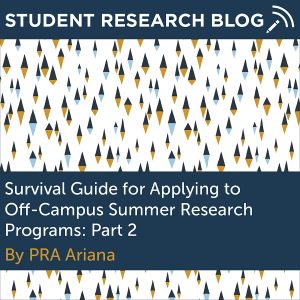 By Ariana Rojas, Peer Research Ambassador
By Ariana Rojas, Peer Research Ambassador
In part 1 of this 2-part blog post I talked about finding programs. Now we’re going to discuss navigating the application process.
The Application
The application may seem like the most daunting part of the process, but it can be very simple. First, you will almost always need letters of recommendation, so secure those early. The last thing you want to happen is to find an amazing program, write a show-stopper personal statement and then not be able to submit your application in time because you did not give your recommendation writers enough time to write the letter. You should give professors a minimum of two weeks to write a letter, but it’s best if you can secure a commitment 3 – 4 weeks beforehand.
When requesting a letter, it’s best to link the program(s) you’re applying to and indicate which research projects interest you the most, so the writers have an idea of what the program is focused on and what they want recommenders to comment on. Your next step is to curate a personal statement. This may seem difficult if you don’t have any research experience, but don’t fret. Most of these programs, like REU’s for example, specifically look for students with little or no experience. If this is you, I would suggest focusing on what your research interests are, why you are getting involved in research, how research intersects with your future goals, and what skills you already have. Benchwork skills are not the only skills important to research – resilience, time management, and teamwork are also extremely important. Don’t forget to bring your personal statement to the writing center as well, grammar mistakes can distract from a beautifully written statement.
The Decision
Eventually you will get your decision notification and it will say one of two things, they’re offering you a research opportunity or they’re not. If you got an offer, then congratulations! If it was the only program that offered you a position, then your decision may be fairly easy. If you were accepted into more than one program, then you’ve got a tough decision on your hands.
However, if you didn’t get an offer, don’t be discouraged. Many of these programs get hundreds of applications and have low acceptance rates. You may have been just as qualified as the person who was offered a spot, so don’t take it personally. If you’re reading this and hearing about a very low acceptance rate makes you not want to apply to any of these programs, I want to give you a piece of advice. You should never self-select yourself out of an opportunity simply because you think you won’t get it. If you never apply, there is a 100% chance that you won’t get it. However, if you do take that chance and apply there’s a chance that you will. This process is scary, and rejection is difficult to become comfortable with, but it’s an important aspect of research. Nobody enjoys rejection, but it gets easier with time. I can guarantee you that your upperclassmen friends, all of the PRA’s, and your professors could tell you many stories about their rejections. Hearing some of those stories might make you feel a little better. And you never know, a rejection from one program may lead you on a research path for the better! I personally applied to at least 25 internships that spring and only got an acceptance from one, the UNF REU program. That program set me on a research career I may have never discovered if I didn’t participate that summer.
Good luck on your search, you’ve got this!
Ariana is a senior majoring in Molecular & Cell Biology with minors in Political Science and Environmental Studies. Click here to learn more about Ariana.